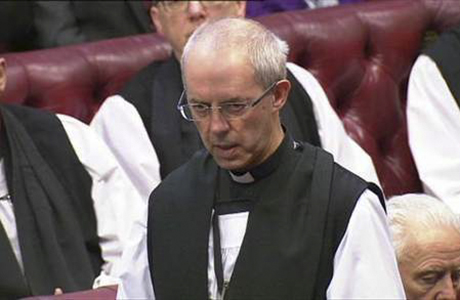Ekklesia has published responses to an open letter by clergy sexual abuse survivor and advocate, Gilo, to press the Archbishop of Canterbury to support mandatory reporting of abuse allegations within the church. Ekklesia describes itself as “an independent, not-for-profit thinktank which orients its work around the changing role of beliefs, values and faith/non-faith in public life.”
Following the publication on Ekklesia and Thinking Anglicans of an Open Letter to the Archbishop of Canterbury, Justin Welby, from sexual abuse survivor Gilo (2 November 2017), the Archbishop replied in general terms (8 November 2017) — but, crucially, did not address the proposals for change raised in the letter. As a follow up, comments on the correspondence have been solicited from senior church figures, academics, practitioners and commentators. The polite but persistent challenge continues: the Church of England (and other churches) cannot be allowed simply to cover their tracks legally, issue sympathy, adopt procedures and guidelines, and continue to think that it is adequate to police themselves on matters of abuse. The pressure will grow and continue until the most senior figures in the C of E face up to what is at stake in this — real lives, truth, integity, thoroughgoing repentance, proper restitution and mandatory reporting.
Gilo’s open letter included a number of suggestions for improving the response of the church to sexual abuse survivors – including supporting mandatory reporting.
Lastly, could I ask you whether you would be prepared to commit the Church to work actively to introduce mandatory reporting of institutional abuse as it used to do, for example in co-operation with Baroness Walmsley?
In his reply, the Most Revd Justin Welby referred to mandatory reporting as “a complicated question.”
It is now the case that bishops and other clergy holding office in the Church of England are expected to report a safeguarding issue or disclosure and are liable to disciplinary proceedings should they fail to do so. As you know we are now in the middle of an Independent Inquiry into Child Sex Abuse and I am keen to hear its views and wisdom about the matter of mandatory reporting – which is not as straightforward an issue as is sometimes suggested.
The latest update via Ekklesia includes a number of comments on mandatory reporting and the Archbishop’s response from a variety of people involved with the church, safeguarding, and legislation. A brief selection is included below: for more, visit the original Ekklesia press release.
Baroness Walmsley (whose Parliamentary work on mandatory reporting the C of E used to support)
My view about mandatory reporting is that it is a very simple matter, not complex at all. If you know or suspect that a child is being abused, or has been abused, you must report the matter to the correct authorities. To fail to do so is to collude with the perpetrator. End of!
Julian Whiting (Ex-Met Police and Survivor)
I am deeply saddened by the Archbishop’s response to this articulate and considered letter. Does Archbishop Welby have the authority to write a response that reaches out and engages with the questions raised without internal lawyers and insurers checking it first? It plumbs the depth in terms of business etiquette and is a reminder of how power works in this country. I pray the Archbishop will be granted supernatural power to clean out the old in the system – and to embrace and engage with something new.
Rt Rev Dr Alan Wilson (Bishop of Buckingham)
Whilst Archbishop Justin’s letter strikes a sincere, kind and conciliatory note, the letter to him contained positive and particular questions that require a substantial response. Given +Tim’s major involvement in particular problems in the response to this case up to now, I was surprised by the suggestion the way forward should be left in his hands. So I’m an optimist, but have to say I think the letter was a sign of progress, but also how far we have to go to make the Church a safe place for vulnerable people, and to avoid the effects of disclosure being compounded by the Church’s institutional response.
Mandate Now
Mandatory Reporting (‘MR’) operates in institutional settings in 73% of Asia, 77% of Africa, 86% of Europe and 90% of the Americas. Empirical evidence supports it. Through Bishop Paul Butler, the CofE supported Baroness Walmsley’s Amendment 43 seeking introduction of MR during the passage of the Serious Crimes Bill in July and then again in October 2014. But as a result of an unexplained volte face, optimism the Church of England was finally committing to safeguarding with accountability has evaporated. If the Church is already reporting all incidents of suspected and known abuse to the Local Authority for independent assessment, what can possibly be ‘complicated’ about its support of MR?
Andrew Graystone (Broadcaster and theologian)
The Archbishop’s letter is painful to read, and he is clearly caught in an impossible dilemma. In the first two paragraphs we see Welby the Archbishop, deferring to lawyers and insurers, a beleaguered safeguarding team and his strategists. My guess is that he hates putting his name to this clinically constructed stuff. Then in the final paragraph we see Justin Welby the pastor, who knows all about struggle and frailty, trying to express genuine human concern. This dilemma between institutions and individuals is addressed repeatedly in the gospels. In every case, Jesus makes clear that people take priority over religious institutions. It would be a powerfully prophetic act if Archbishop Welby could use the authority of his office to face down the principalities and powers of his institution, and put victims first.

